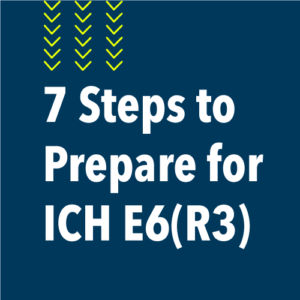Arriving on a desktop near you soon, just about everyone in the clinical research enterprise who remembers the last era of updates knows that something big is coming down the line in the form of the International Council for Harmonization’s (ICH’s) next iteration of its guidelines for Good Clinical Practice (GCP). It may be nothing but good news for some, it may mean dealing with a learning curve due to extra compliance expectations for others, it may call for overhauls of processes once taken for granted, but the many changes in the forthcoming ICH GCP E6(R3) can be expected to work their way into all levels of organizations and their workforces.
As we prepare for the changes outlined in the ICH E6(R3) guidance, it’s crucial for organizations to begin proactively assessing how their existing processes, standard operating procedures (SOPs), and policies align with the anticipated updates. This is a key moment to rethink clinical trial conduct and embrace a more flexible, risk-based approach to ensure that we are positioned for greater efficiency, quality, and compliance in the evolving landscape of clinical research.
Here are some practical suggestions for organizations to think about when preparing their organizations for the upcoming guidance changes:
- Conduct a Comprehensive Review of Current SOPs and Policies
Begin by performing a thorough assessment of your existing SOPs, policies, and procedures to understand how they align with current ICH E6(R2) requirements (Step 4 version of November 9, 2016). Identify any gaps or areas where practices may be outdated or misaligned with the evolving expectations of ICH E6(R3).
- Start Early, Involve Interested Parties, and Foster a Collaborative Approach
Involve interested parties from various functions (clinical operations, regulatory affairs, data management, information technology, risk management, quality assurance) early in the process. This collaboration will ensure that all perspectives are considered and will help integrate changes seamlessly across the organization. Think about conducting workshops, establishing feedback loops, and adhering to continuous communication.
- Focus on a Risk-Based Approach to Trial Design and Management
The ICH E6(R3) guidance emphasizes a more flexible, risk-based approach to clinical trials. This will involve a shift toward greater reliance on risk assessments, which will need to be incorporated into your organizational processes. Review risk management plans, define risk thresholds, and adapt existing monitoring plans.
- Prepare for Enhanced Use of Technology and Data Management Tools
The increasing reliance on technology in clinical trials, including electronic health records, electronic data capture, and remote monitoring, will continue to grow under ICH E6(R3). Organizations should start evaluating how to integrate new technologies to support more efficient trial management.
- Revise Training and Competency Frameworks
As processes and technologies evolve, so too must the competencies of the workforce. Begin by reviewing your current training programs to ensure they are aligned with the changes expected under ICH E6(R3). How will you train new employees and incorporate continuous training? Visit the ACRP Guidelines and Regulations Resources Center for help and perspectives along the way.
- Update Trial Oversight and Governance Structures
As the ICH E6(R3) guidance emphasizes a more decentralized and flexible approach to trial oversight, organizations should assess whether their current governance structures are fit for purpose.
- Plan for Ongoing Monitoring and Adaptation
Preparing for the changes in ICH E6(R3) is not a one-time task. Once you begin implementing changes, you’ll need to continuously monitor and adapt your processes to ensure they remain effective.
By conducting a thorough review of current processes, embracing a risk-based approach, adopting new technologies, and fostering a culture of collaboration and continuous learning, organizations can position themselves for success. This is a time to be proactive, engage multiple perspectives across functions, and make thoughtful updates to ensure clinical trials remain efficient, compliant, and patient-centric.
Let’s use this moment to embrace new ways of working, promote innovation, and ensure our processes are more flexible, efficient, and adaptable in the future clinical trial landscape.
Submitted by Jessica Fritter, DHSc, MACPR, ACRP-CP, Associate Clinical Professor at The Ohio State University, who oversees the Master of Clinical Research and Undergraduate Clinical Trials Sciences Certificate in the College of Nursing. She is also the ACRP Ohio Chapter President.
Edited by Gary Cramer




